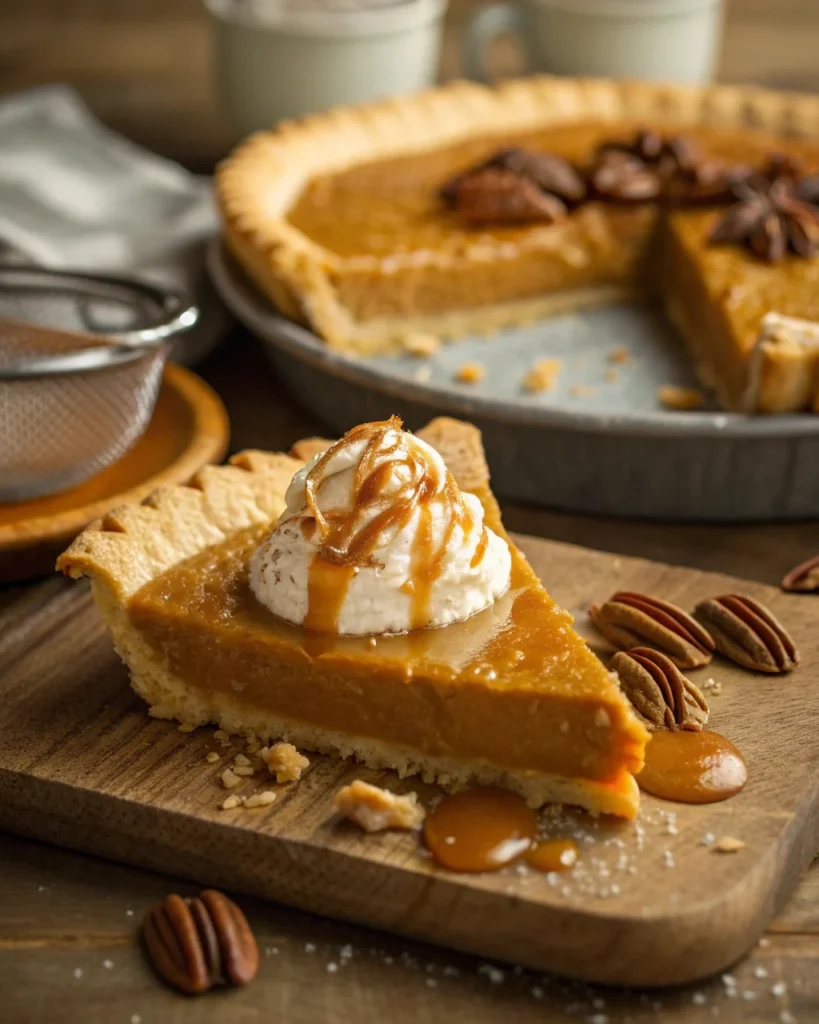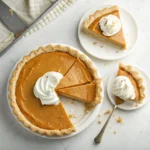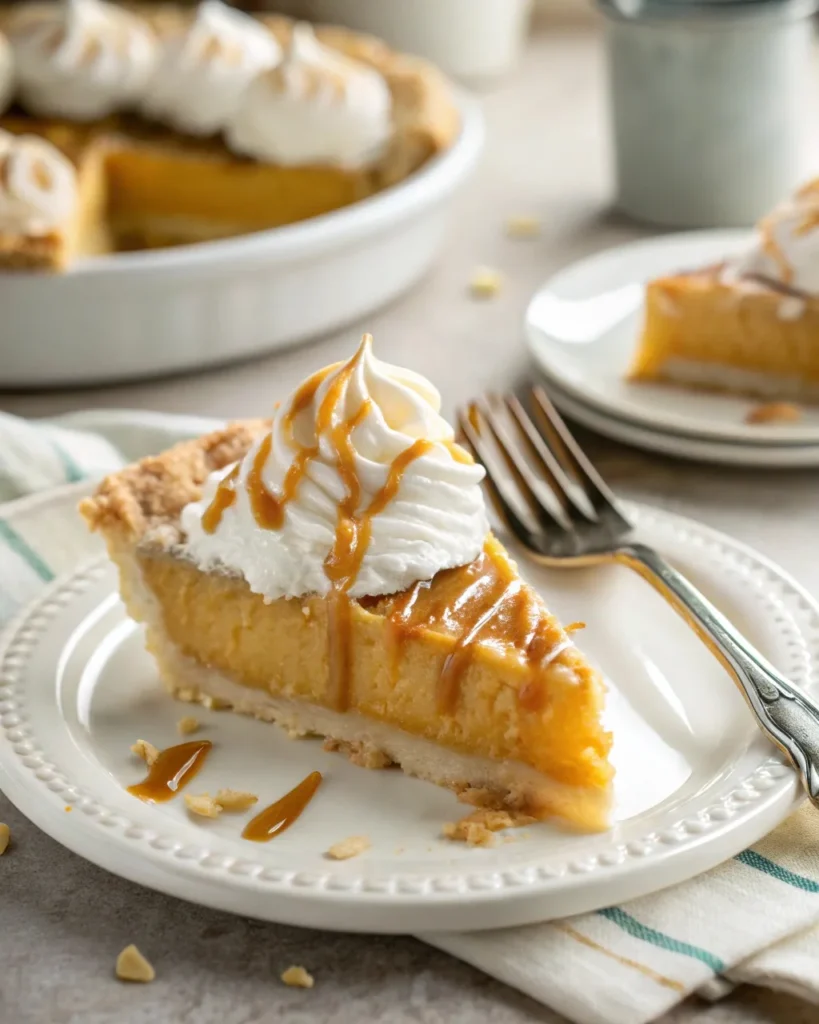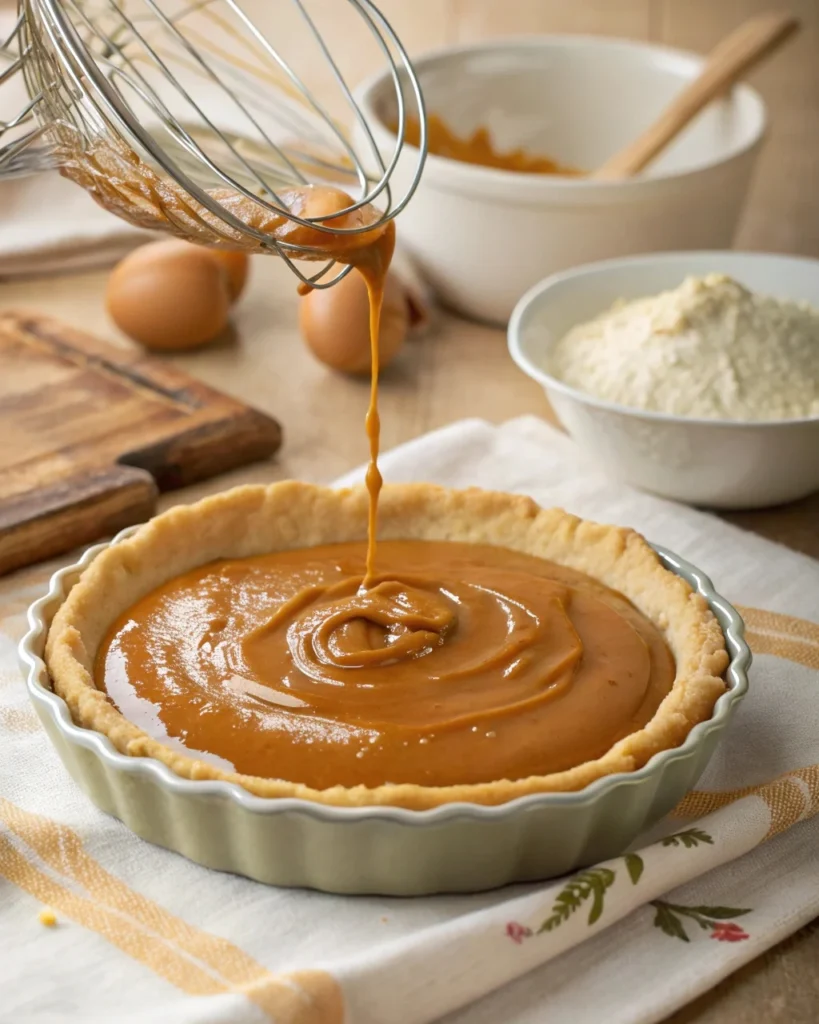There’s something about butterscotch pie that instantly brings a smile. It’s rich yet comforting, simple yet elegant, and always a crowd-pleaser. Growing up, pies like this were the highlight of family gatherings — the kind of dessert that made the whole house smell warm and sweet. In this article, we’ll dive into everything you need to know: from the origins of this custard-filled pie, to the step-by-step recipe, tips for variations, and answers to the most common questions. By the end, you’ll be ready to bake your own golden slice of happiness.

The History and Charm of Butterscotch Pie
Origins of Butterscotch
Butterscotch dates back to 19th-century England, originally made from brown sugar and butter. Over time, it made its way into custards, candies, and eventually pies.
Why Butterscotch Pie Became Popular
The pie became especially beloved in the American South, where its silky custard and flaky crust offered a sweet finish to hearty meals.

Butterscotch Pie
- Total Time: 50 minutes
- Yield: 8 servings 1x
Description
This classic butterscotch pie features a rich custard filling made with brown sugar, butter, and vanilla, nestled in a flaky pie crust and topped with whipped cream or meringue. Silky, sweet, and comforting—perfect for family gatherings or holidays.
Ingredients
1 (9-inch) pie crust, pre-baked
½ cup (1 stick) unsalted butter
1 cup packed brown sugar (light or dark)
¼ cup all-purpose flour or 3 Tbsp cornstarch
2 ½ cups whole milk or heavy cream
4 large egg yolks
1 tsp vanilla extract
Whipped cream or meringue for topping (optional)
Instructions
1. Preheat oven to 350°F (175°C). Place prepared pie crust into a 9-inch pie dish and pre-bake for 10 minutes.
2. In a medium saucepan, melt butter over medium heat. Stir in brown sugar until smooth.
3. Add flour or cornstarch and whisk for 1–2 minutes.
4. Slowly whisk in milk or cream. Continue whisking until mixture thickens and coats the back of a spoon.
5. In a small bowl, whisk egg yolks. Slowly add a little of the hot mixture to temper, then return yolks to the pan, whisking constantly.
6. Cook for another 2–3 minutes until thick and glossy. Remove from heat and stir in vanilla extract.
7. Pour custard filling into the pre-baked crust. Bake 20–25 minutes until set.
8. Let the pie cool completely, then top with whipped cream or meringue before serving.
Notes
For a deeper flavor, use dark brown sugar.
Chill pie overnight for cleaner slices.
Top with toasted pecans or butterscotch drizzle for extra flair.
- Prep Time: 15 minutes
- Cook Time: 35 minutes
Key Ingredients in Butterscotch Pie
The Magic of Brown Sugar and Butter
Brown sugar and butter are the backbone of butterscotch pie. Together, they create that deep, caramel-like sweetness.

Other Essential Ingredients
Eggs give the filling structure, while milk or cream makes it velvety smooth. A touch of vanilla ties it all together, while cornstarch or flour helps the custard set perfectly.
Step-by-Step Recipe for Butterscotch Pie
Preparing the Crust
- Preheat oven to 350°F (175°C).
- Place prepared pie crust into a 9-inch dish. Prick with a fork and pre-bake for 10 minutes to keep it crisp.
Making the Custard Filling
- In a saucepan, melt butter over medium heat. Stir in brown sugar until smooth.
- Add flour or cornstarch and whisk for 1–2 minutes.
- Slowly whisk in milk or cream. Cook until mixture thickens.
- Temper egg yolks with a little hot mixture, then whisk them back in.
- Cook another 2–3 minutes until thick and glossy. Remove from heat and stir in vanilla.

Baking the Pie
- Pour filling into pre-baked crust.
- Bake for 20–25 minutes until just set.
- Cool completely before adding topping.
Adding the Topping
You can top it with whipped cream for a light finish or with meringue for a traditional touch.
If you’re a pie lover, you’ll also enjoy my Pumpkin Pie Cookies — they bring the same warm, spiced comfort in bite-sized form.
Tips and Tricks for Perfect Butterscotch Pie
Preventing a Runny Filling
Cook custard until thick enough to coat the back of a spoon. Always allow the pie to cool fully before slicing.
Achieving the Right Sweetness
If you prefer a lighter sweetness, use light brown sugar. For a deeper, richer flavor, go with dark brown sugar.
Delicious Variations of Butterscotch Pie
Butterscotch Pie with Meringue
For a retro finish, top with fluffy meringue and bake until golden.
Butterscotch Cream Pie
Skip baking after adding the custard and top with chilled whipped cream for a no-bake style twist.
Storage, Make-Ahead, and Freezing Tips
How to Store Butterscotch Pie
After cooling, cover loosely with foil or plastic wrap and refrigerate for up to 3–4 days.
Freezing and Make-Ahead Options
Freeze without toppings for up to 2 months. Thaw in the fridge overnight before serving, then add whipped cream or meringue.
Conclusion
At the end of the day, butterscotch pie is one of those desserts that feels like a hug in pie form. It’s smooth, sweet, and rich, yet still simple enough for any home baker to master. Whether you’re baking for family, holidays, or just a weekend treat, this pie will always hit the mark.
For more sweet inspiration, check out some of my reader favorites like Chewy Snickerdoodle Cookie Bars.
FAQs
Butterscotch pie is made with a custard filling of butter, brown sugar, milk or cream, and egg yolks. It’s poured into a pre-baked crust and topped with whipped cream or meringue.
While caramel pie uses caramelized sugar for flavor, butterscotch pie relies on butter and brown sugar. This gives it a deeper, toffee-like taste that’s creamier and less sharp than caramel.
Yes! Butterscotch pie actually tastes better when made a day in advance. This gives the custard time to set, making it easier to slice. Just store it in the fridge, covered.
To avoid a runny pie, cook the filling until it’s thick enough to coat the back of a spoon. Using the right amount of cornstarch or flour also helps the custard hold together when cooled.
Butterscotch pie is best served chilled. Once baked, allow it to cool completely, then refrigerate. The custard firms up and the flavors deepen when it’s cold.
